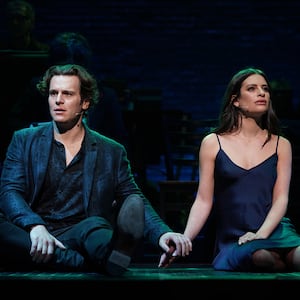There’s no shortage of goosebump-inducing moments in the 2006 coming-of-age musical Spring Awakening—or in the new HBO documentary about it, Spring Awakening: Those You’ve Known. But, as original cast member Jonathan Groff highlights in the film, one moment in particular stands out as the perfect distillation of the show’s essence.
On stage, a young man with a shock of messy hair, teased and gelled into a gravity-defying punk rock style, pulls a microphone out of the jacket pocket of his 19th century school uniform.
This is John Gallagher Jr. playing Moritz Stiefel, an anxious teenager tormented by the changes brought by adolescence. He is in the middle of a Latin lesson, surrounded by classmates in identical outfits and identical states of horny teen angst. Over an electric guitar riff, he launches into the first verse of “The Bitch of Living,” a song about the agony of puberty. His voice is all Billie Joe Armstrong as he spits out lyrics like, “She said, ‘Give me that hand, please and the itch you can’t control / Let me teach you how to handle all the sadness in your soul.’”

The song is irresistibly catchy, the lyrics are funny, and Gallagher’s performance is mesmerizing. The juxtaposition between the setting of Germany in the 1800s and the sexed-up, unmistakably rock-and-roll music, all playing out on a Broadway stage, is nothing short of magical. “The sound of John Gallagher singing the beginning of ‘Bitch of Living’ is Spring Awakening,” Groff says emphatically in the documentary.
More specifically, Spring Awakening is a rock musical adapted from Frank Wedekind’s 1891 play of the same name about the struggles of children coming of age in a sexually oppressive culture. Written by Steven Sater with music by Duncan Sheik, it infuses the play’s original setting with raw, unflinching contemporary music to capture the timelessness of its themes. In addition to Groff and Gallagher, it starred Lea Michele before her ascent to fame on Glee. The musical became a cultural phenomenon, winning eight Tony Awards, turning its young stars into celebrities, and attracting screaming audiences of obsessive fans.
Premiering on HBO on Tuesday, Spring Awakening: Those You’ve Known offers a behind-the-scenes look at last year’s reunion concert in honor of the show’s 15th anniversary. The one-night-only event brought together the original Broadway cast to raise money for the Actors Fund. Directed by Michael John Warren, the poignant documentary combines performances from the anniversary concert with footage from the original run, both on and off stage. The clips are woven together by revelatory interviews with members of the cast and crew.
Reader, it is here that I must issue a warning. Do not watch Spring Awakening: Those You’ve Known unless you are prepared to cry and cry. And headbang to songs that rock hard enough to convert even the most stubborn Broadway musical cynic. And then cry some more.
“I don’t know that I ever thought we would ever do this again,” says Lauren Pritchard, who played Ilse in Spring Awakening and had the initial idea for the reunion. “There was never fucking anything like this that’s ever happened on the Broadway stage.” Within three minutes, the waterworks come when the cast first steps out onto the stage for the concert to deafening applause, all of them crying and soaking up the significance of their togetherness in that room again after all those years.

Most of them teenagers when they first started working on Spring Awakening, they are now in their thirties and have gone on to have successful careers on Broadway, and in TV and film. Groff’s impressive résumé includes leading the Netflix serial killer drama Mindhunter, making several TV and movie appearances, and originating the role of King George in Hamilton. Pitch Perfect star Skylar Astin played a minor but memorable character in Spring Awakening, a schoolboy obsessed with his piano teacher’s cleavage. And Lea Michele is, well, Lea Michele.
The throwback footage from 2006, however, shows them all as unknown teens, just like the characters they play. They navigate unrequited crushes, goof off in their dressing rooms, and sprawl across each other’s laps in the downtime during rehearsals. In the first rehearsal for the reunion in 2021, Groff is brought to tears by Michele singing the show’s opening number, “Mama Who Bore Me,” her voice as stunning and clear as ever. “Watching her sing that song, I was like, ‘Oh my God,’” he explains. “I saw this 19-year-old girl memory and I just lost my mind.”
Much of Those You’ve Known focuses on the platonic love between Groff and Michele, the closeness of their bond a testament to the emotional intensity of the show that brought them together. They played Melchior and Wendla, respectively, two kids who consummate their confusing, powerful new feelings for each other in a hayloft, resulting in Wendla’s pregnancy and tragic death from a botched abortion.
During their time doing Spring Awakening, Michele was deeply in love with her co-star, and he was an in-the-closet gay 20-year-old. They became best friends. At one point, Michele hilariously recounts the time that she satisfied Groff’s curiosity about female anatomy by showing him her vagina with a desk lamp.
Early reports of the anecdote went viral last week—completely out of context, of course—but in the film, it is a genuinely endearing reminiscence between two lifelong friends. Those You’ve Known is Michele’s first major project since being accused by former co-stars of microaggressions and rude behavior on the set of Glee. The film doesn’t address the controversy, for which Michele has apologized, but it does quietly remind viewers of her preternatural talent and star power.
The musical performances are unsurprisingly incredible—at turns full of fury and sadness, of lust and emotional longing. Ultimately, though, Spring Awakening: Those You’ve Known is a love letter to theater and its ability to make people feel seen. It captures the effect that the heaviness of the material had on its young performers, who night after night acted out suicide, abuse, and grief, but persevered because of the letters they got from fans telling them the show saved their lives.
“I think that’s kind of what got us through it every night,” says cast member Lilli Cooper near the film’s end, “knowing how important it was to tell that story.”







